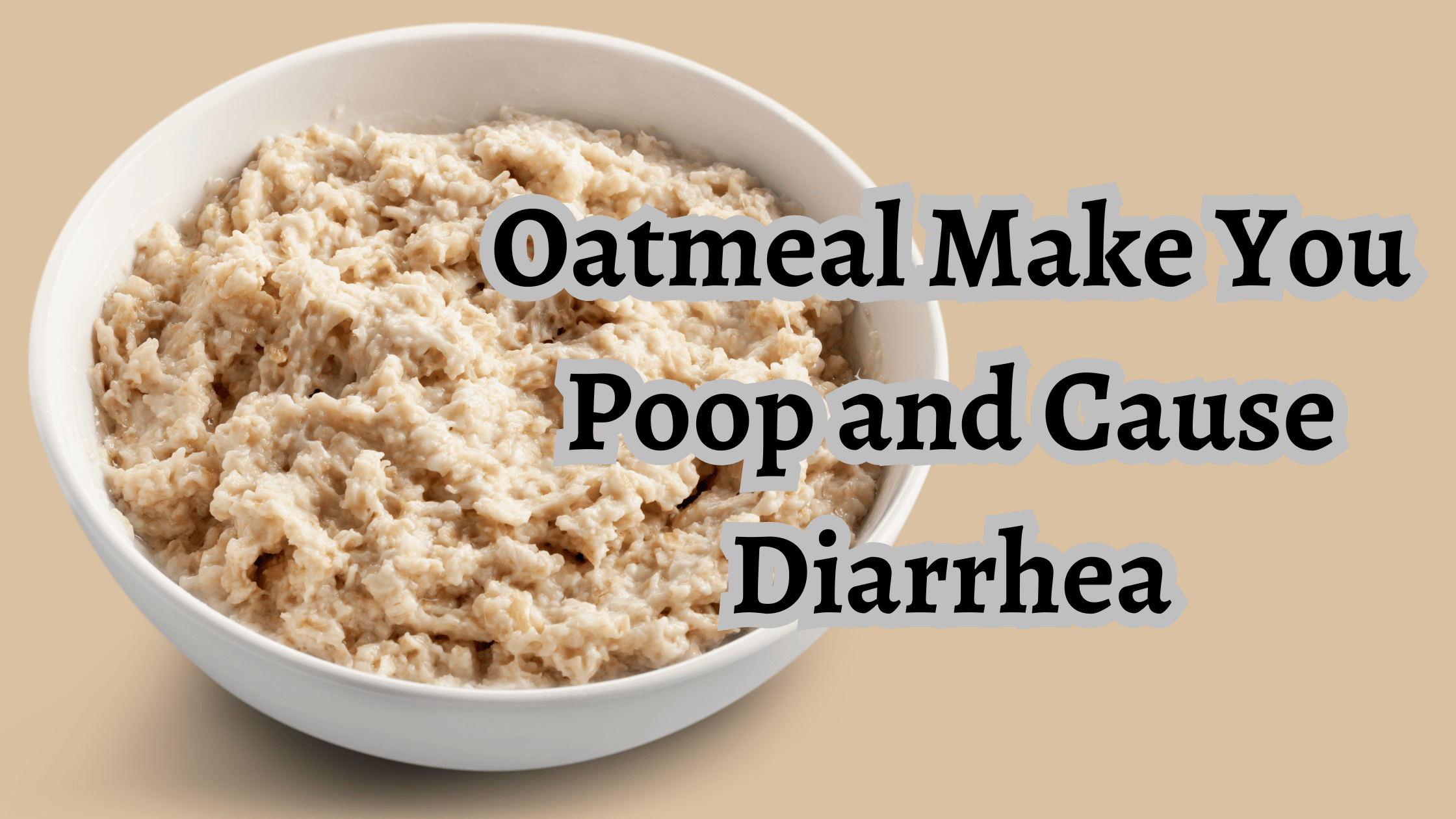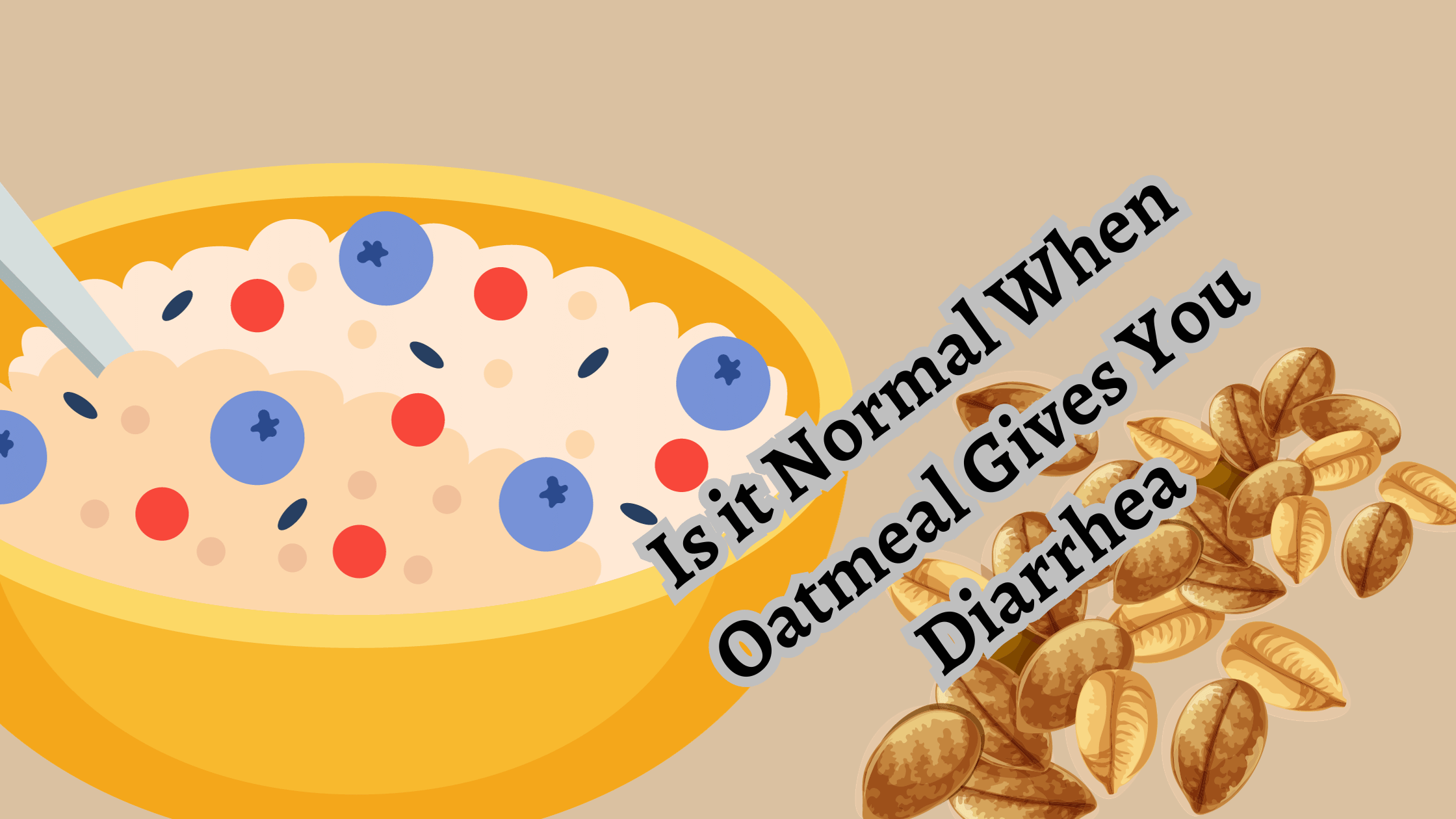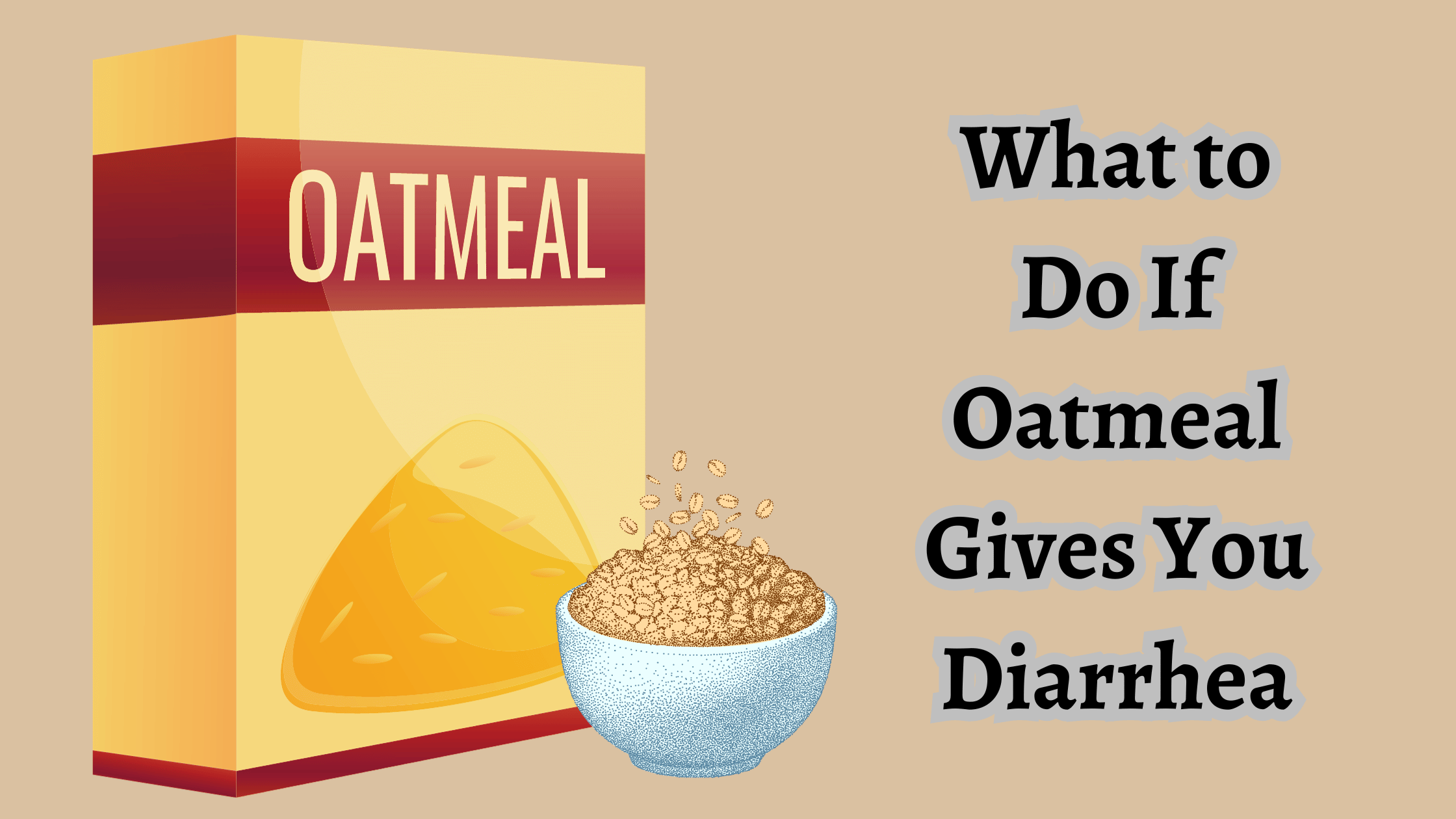
Oatmeal, a beloved breakfast staple, has long been celebrated for its numerous health benefits. Its high fiber content, which aids in digestion, makes it a popular choice for those seeking a wholesome morning meal. However, some individuals may experience unexpected effects, including increased bowel movements and even diarrhea, after consuming oatmeal.
Does Oatmeal Make You Poop and Cause Diarrhea? Yes, oatmeal can have a dual impact on your digestive system. Its high fiber content often promotes regular bowel movements, making it a beneficial choice for those with constipation. However, for some individuals, oatmeal can lead to diarrhea, potentially due to fiber sensitivity, gluten contamination, or an excessive intake of fiber from various sources. The effects vary from person to person, so it’s essential to monitor how your body responds to oatmeal and adjust your consumption accordingly.
In this article, we will delve into the various aspects of this phenomenon and explore the questions that surround it. From understanding the link between oatmeal and bowel movements to dealing with potential discomfort, we’ve got it all covered.
Does Oatmeal Make You Poop? True
The Digestive Power of Oatmeal
Oatmeal is well-known for its role in promoting regular bowel movements. This is largely due to its high fiber content, with each serving providing a substantial amount of dietary fiber. Fiber is essential for maintaining healthy digestion, as it adds bulk to the stool and encourages regularity in bowel movements. However, the extent to which oatmeal affects an individual’s bowel movements can vary.
The Role of Fiber
Fiber is a non-digestible carbohydrate that passes through the digestive system largely intact. It acts as a natural laxative by softening the stool and making it easier to pass. Oatmeal contains both soluble and insoluble fiber, which play different roles in digestion. Soluble fiber, found in oatmeal, forms a gel-like substance in the digestive tract, which can help regulate bowel movements. Insoluble fiber, on the other hand, adds bulk to the stool, facilitating its movement through the intestines.
Can Oatmeal Give Diarrhea?
While oatmeal can indeed have a positive impact on regularity for many people, it is also possible for it to lead to diarrhea in some cases. Diarrhea is characterized by loose, watery stools and increased frequency of bowel movements. The key question is: why does oatmeal sometimes have this effect, and is it considered normal?
Is it Common When Oatmeal Makes You Poop?
Experiencing more frequent bowel movements after consuming oatmeal is not uncommon. The fiber in oatmeal can stimulate the digestive system, which may lead to an increase in the number of bowel movements. This effect can be seen as a positive outcome for those who struggle with constipation or irregularity, as it helps in promoting a healthier digestive system.
Is it Comon When Oatmeal Gives You Diarrhea?

While an increase in bowel movements is considered normal for some individuals, experiencing diarrhea as a result of oatmeal consumption is less common and may indicate an issue with tolerance or sensitivity. If oatmeal consistently leads to diarrhea, it may be a sign of an underlying digestive problem or an intolerance to a specific component of oatmeal.
Why Does Oatmeal Make You Poop? Reasons
To understand why oatmeal might make you poop, it’s important to consider the role of dietary fiber and other components in this popular breakfast food.
High Fiber Content
As mentioned earlier, oatmeal is packed with dietary fiber, making it an effective tool for regulating bowel movements. Soluble fiber, in particular, absorbs water in the digestive tract, forming a gel-like substance that helps soften the stool and promote regularity. When consumed regularly, oatmeal can become a part of a balanced diet that supports a healthy digestive system.
Stimulation of the Bowels
Fiber acts as a natural stimulant for the bowels. When you consume oatmeal, the fiber content sends signals to the digestive system to move things along. This stimulation can lead to an increased frequency of bowel movements, and for many people, this is a welcome change, especially if they suffer from constipation.
Why Does Oatmeal Give Me Diarrhea? Reasons
If oatmeal gives you diarrhea, there could be several reasons for this adverse reaction. It’s essential to investigate the potential causes and address any concerns you may have regarding your digestive health.
Fiber Sensitivity
One possible reason for oatmeal causing diarrhea is fiber sensitivity. While fiber is generally beneficial for digestion, some individuals may be sensitive to high-fiber foods like oatmeal. This sensitivity can result in digestive discomfort, including diarrhea.
Intolerance to Gluten
Oatmeal naturally does not contain gluten, but it is often processed in facilities that handle wheat, barley, and rye, which are gluten-containing grains. Cross-contamination is possible, leading to small traces of gluten in oatmeal products. For those with gluten sensitivity or celiac disease, even minimal exposure to gluten can trigger diarrhea and other gastrointestinal symptoms.
High-Fiber Diet
Consuming an excessive amount of fiber can overwhelm the digestive system and lead to diarrhea. If oatmeal is part of a diet that is already high in fiber due to other foods, it could contribute to gastrointestinal distress.
What to Do If Oatmeal Makes You Poop? Give Tips
If you find that oatmeal leads to increased bowel movements, and it’s not causing you discomfort or diarrhea, you may not need to take any specific action. However, if you want to moderate its impact on your bowel movements, consider the following tips:
1. Portion Control
Reduce your oatmeal portion size to see if it lessens the impact on your bowel movements. Smaller servings might be better tolerated.
2. Gradual Introduction
If you are new to oatmeal, introduce it gradually into your diet to allow your digestive system to adapt.
3. Stay Hydrated
Ensure you are drinking enough water, as fiber absorbs water in the digestive tract. Proper hydration can help balance the effects of fiber.
4. Monitor Your Diet
Consider the overall composition of your diet, especially the fiber content from other sources. Adjusting your diet as a whole can help manage the impact of oatmeal.
What to Do If Oatmeal Gives You Diarrhea? Tips Given

If oatmeal consistently gives you diarrhea or you experience severe discomfort, it’s important to take action and address the issue. Here are some steps to consider:
1. Rule Out Gluten Contamination
If you suspect gluten contamination may be the culprit, opt for certified gluten-free oatmeal products, which are processed in facilities dedicated to gluten-free production.
2. Try Different Types of Oatmeal
Different types of oatmeal, such as steel-cut oats, rolled oats, and instant oats, may affect you differently. Experiment with various options to find out which one is best tolerated.
3. Reduce Fiber Intake
If you are consuming high levels of fiber from various sources, consider reducing your overall fiber intake to see if it alleviates the diarrhea.
4. Consult a Healthcare Professional
If you continue to experience diarrhea after trying these steps, consult a healthcare professional. They can help diagnose any underlying digestive issues and provide guidance on managing them.
How Speedy Does Oatmeal Make You Poop?
The speed at which oatmeal leads to bowel movements can vary from person to person. Generally, oatmeal’s fiber content can stimulate the digestive system within a few hours to a day after consumption. However, this timing depends on an individual’s digestive health, tolerance to fiber, and overall diet.
Does Oatmeal Help You with Constipation?
Oatmeal can be a valuable addition to a diet aimed at alleviating constipation. Its high fiber content aids in softening the stool and promoting regular bowel movements. To use oatmeal as a remedy for constipation, ensure you are drinking enough water, gradually introduce it into your diet, and maintain a balanced and fiber-rich overall diet.
Does Oatmeal Make Your Poop Smell Bad?
Oatmeal itself is not responsible for causing significant changes in the odor of your stool. The smell of your stool is primarily influenced by the bacterial activity in your intestines, the types of foods you consume, and your individual digestive system. While oatmeal may increase the frequency of bowel movements, it is unlikely to have a pronounced impact on the smell of your stool.
Does Oatmeal Make You Fart?
Oatmeal is generally not known to cause excessive gas or flatulence. However, some individuals may experience increased gas production after consuming oatmeal due to their unique digestive system and how it responds to specific foods. If you find that oatmeal makes you gassy, it may be helpful to experiment with portion sizes and types of oatmeal to identify what works best for you.
Frequently Asked Questions
Does Oatmeal Can Change Stool Color?
Oatmeal itself is not known to change the color of your stool. Stool color is primarily influenced by the foods you consume and the presence of certain pigments or substances. If you notice a significant change in stool color after consuming oatmeal, it may be advisable to consult a healthcare professional for further evaluation.
Eat Lots of Oatmeal Make You Poop More?
Consuming large quantities of oatmeal can indeed lead to more frequent bowel movements. Oatmeal’s high fiber content can stimulate the digestive system, increasing the number of bowel movements. For those who need to promote regularity, this can be seen as a positive effect.
Is Oatmeal a Natural Laxative?
Oatmeal can be considered a natural laxative to some extent due to its high fiber content. The soluble fiber in oatmeal helps soften the stool and promote regular bowel movements. It is a gentler and healthier option than many over-the-counter laxatives.
Does Oatmeal Cause Bowel Movements?
Oatmeal can stimulate bowel movements due to its fiber content, which encourages the regular movement of stool through the digestive system. However, this effect may vary from person to person.
Does a lot of Oatmeal Cause Diarrhea in Babies?
Oatmeal can be introduced into a baby’s diet as a weaning food, but it should be done with care. Babies have sensitive digestive systems, and introducing new foods, including oatmeal, should be done gradually. Diarrhea in babies can have various causes, so if you suspect oatmeal is the culprit, consult a pediatrician for guidance.
Can Eat Uncooked Oatmeal Cause Diarrhea?
Uncooked oatmeal is less likely to cause diarrhea, but it may be difficult to digest and could lead to digestive discomfort. Cooking oatmeal breaks down the starches, making it more easily digestible and less likely to cause gastrointestinal issues.
Does Instant Oatmeal Cause Diarrhea?
Instant oatmeal is pre-cooked and often contains additives that may not agree with everyone’s digestive system. If you find that instant oatmeal consistently causes diarrhea, consider switching to traditional rolled oats or steel-cut oats, which are less processed and may be better tolerated.
Can Eat Cooked Oatmeal Cause Diarrhea?
Cooked oatmeal is typically easier to digest and less likely to cause diarrhea than uncooked or instant oatmeal. If you experience diarrhea after consuming cooked oatmeal, it may be due to other factors, such as excessive portion size or underlying sensitivities.
Wrap Up
Ooatmeal can have varying effects on bowel movements, from promoting regularity to potentially causing diarrhea. It largely depends on an individual’s digestive system, tolerance to fiber, and overall diet. Hopefully, after reading our article you get the answer why does oatmeal make me poop or can oatmeal cause diarrhea. If you experience persistent digestive issues related to oatmeal, it is advisable to consult a healthcare professional for a thorough evaluation and personalized guidance.